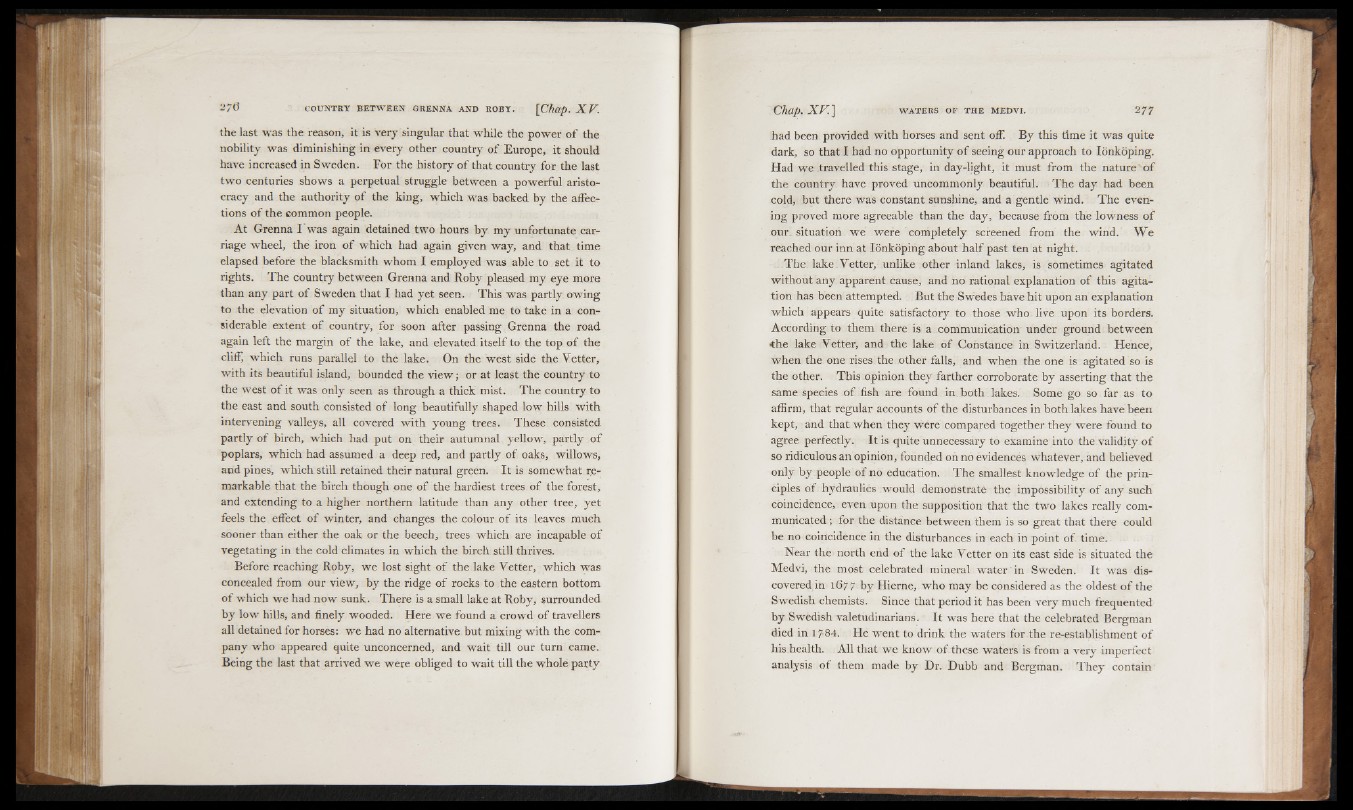
the last was the reason, it is very singular that while the power o f the
nobility was diminishing in every other country o f Europe, it should
have increased in Sweden. For the history o f that country for the last
two centuries shows a perpetual struggle between a powerful aristocracy
and the authority o f the king, which was backed by the affections
o f the common people.
A t Grenna I'was again detained two hours b y my unfortunate carriage
wheel, the iron o f which had again given way, and that time
elapsed before the blacksmith whom I employed was able to set it to
rights. The country between Grenna and Roby pleased my eye more
than any part o f Sweden that I had yet seen. This was partly owing
to the elevation o f my situation, which enabled me to take in a considerable
extent o f country, for soon after passing Grenna the road
again left the margin o f the lake, and elevated itself to the top o f the
cliff which runs parallel to the lake. On the west side the.Vetter,
with its beautiful island, bounded the v iew ; or at least the country to
the west o f it was only seen as through a thick mist. The country to
the east and south consisted o f long beautifully shaped low hills with
intervening valleys, all covered with young trees. These consisted
partly o f birch, which had put on their autumnal yellow, partly o f
poplars, which had assumed a deep red, and partly o f oaks, willows,
and pines, which still retained their natural green. It is somewhat remarkable
that the birch though one o f the hardiest trees o f the forest,
and extending to a higher northern latitude than any other tree, yet
feels the effect o f winter, and changes the colour o f its leaves much
sooner than either the oak or the beech, trees which are incapable o f
vegetating in the cold climates in which the birch still thrives.
Before reaching Roby, we lost sight o f the lake Vetter, which was
concealed from our view, by the ridge o f rocks to the eastern bottom
of which we had now sunk. There is a small lake at Roby, surrounded
by low hills, and finely wooded. Here we found a crowd of travellers
all detained for horses: we had no alternative but mixing with the company
who appeared quite unconcerned, and wait till our turn came.
Being the last that arrived we were obliged to wait till the whole party
had been, provided with horses and sent off B y this time it was quite
dark, so that I had no opportunity o f seeing our approach to Ionkdping.
Had we travelled this stage, in day-light, it must from the nature'of
the country, have proved uncommonly beautiful. The day had been
cold, but there was constant sunshine, and a gentle wind. The evening
proved more agreeable than the day, because from the lowness o f
our situation we were completely screened from the wind. W e
reached our inn at Ionkoping about half past ten at night.
The: lake Vetter, unlike other inland lakes, is sometimes agitated
without any apparent cause, and no rational explanation o f this agitation
has been attempted. But the Swedes have hit upon an explanation
which appears quite satisfactory to those who live upon its borders.
According to them there is a communication under ground between
4he lake Vetter, and the lake o f Constance in Switzerland. Hence,
when thé one rises the other falls, and when the one is agitated so is
the other. This opinion they farther corroborate by asserting that the
same species o f fish are found in both lakes. . Some go so far as to
affirm, that regular accounts o f the disturbances in both lakes have been
kept, and that when they were compared together they were found to
agree perfectly. I t is quite unnecessary to examine into the validity o f
so ridiculous an opinion, founded on no evidences whatever, and believed
only by people o f no education. The smallest knowledge o f the principles
o f hydraulics would demonstrate the impossibility o f any such
coincidence, even upon the supposition that the two lakes really communicated
; for the distance between them is so great that there could
be no coincidence in the disturbances in each in point o f time.
Near the north end o f the lake Vetter on its east side is situated the
Medvi, the most celebrated mineral water in Sweden. I t was dis-
covered.in 1677 b y Hierne, who may be considered as the oldest o f the
Swedish chemists. Since that period it has been very much frequented
by Swedish valetudinarians. I t was here that the celebrated Bergman
died in 1 7-84. He went to drink the waters for the re-establishment of
his health. A ll that we know o f these waters is from a very imperfect
analysis of them made by Dr. Dubb and Bergman. They contain